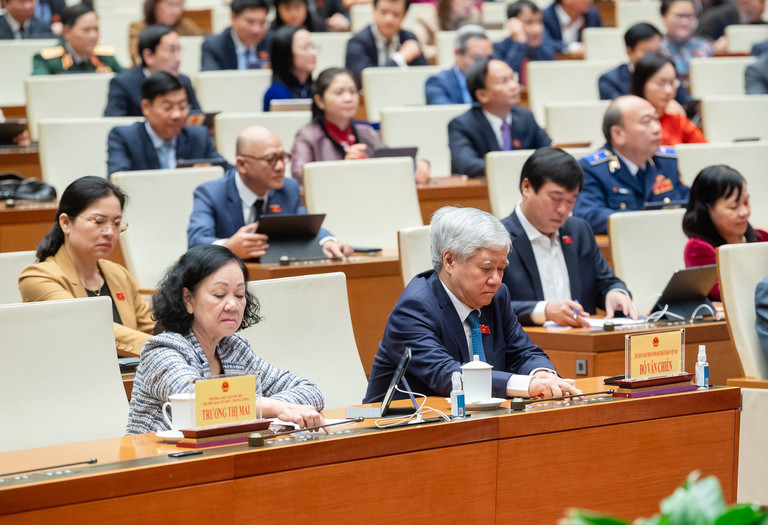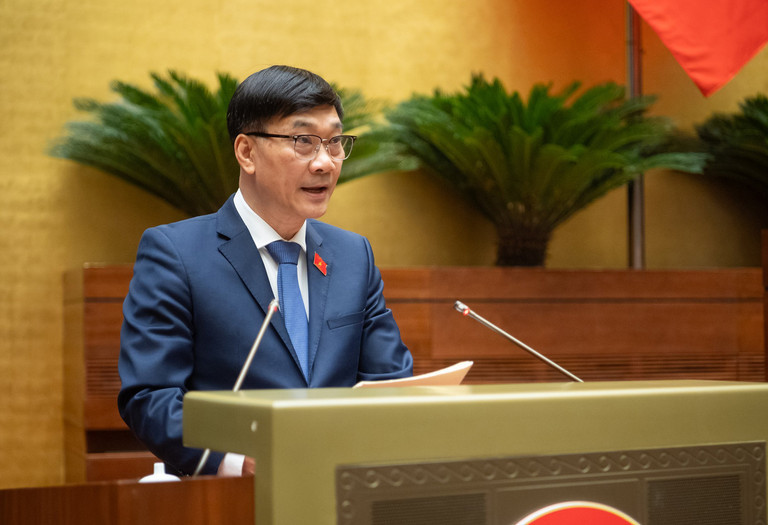The National Assembly passed the amended Land Law and announced a new land price list from January 1, 2026.
With 432 delegates in favor (87.63% of the total number of delegates), the National Assembly voted to pass the amended Land Law with 260 articles, effective from January 1, 2025; in which, there is a provision that the land price list will be announced for the first time and applied from January 1, 2026.
On the morning of January 18, at the closing session of the 5th extraordinary meeting, delegates voted to approveAmended Land Law.
Finalize 4 land valuation methods
Accordingly,National AssemblyFinalize 4 land valuation methods including: Comparison method; Income method; Surplus method; Land price adjustment coefficient method.
The Government is assigned to prescribe other valuation methods not yet prescribed by law, after receiving the approval of the National Assembly Standing Committee.
Along with land valuation methods are cases and conditions for applying land valuation methods.

Specifically, the comparison method is applied to price the case where there are at least 3 land plots with the same land use purpose, certain similarities in factors affecting the land price transferred on the market, winning the auction.land use rightsthat the auction winner has fulfilled the financial obligations according to the auction winning decision;
The income method is applied to valuation in cases where the land plot, agricultural land, non-agricultural land is not residential land and the land plot, land area to be valued does not meet the conditions for applying the comparison method but the income and expenses from land use can be determined according to the land use purpose being valued;
The surplus method is applied to value the case where the land plot or land area for investment project implementation does not meet the conditions for applying the comparison method or the income method but the total development revenue and total development costs of the project can be estimated;
The land price adjustment coefficient method is applied to specifically determine compensation when the State reclaims land in cases of reclaiming many adjacent land plots with the same purpose of use and whose land prices have been regulated in the land price list but do not meet the conditions for applying the comparison method.
This is also an issue that many delegates were interested in discussing, including the suggestion not to prescribe the surplus method in land valuation.
Explaining this issue, Chairman of the Economic Committee Vu Hong Thanh said that the National Assembly Standing Committee said that land valuation is a difficult issue. The content of the provisions in the draft law has been accepted by the National Assembly and the Government, seriously studied to design valuation methods that are both inheritable and practical, innovative but must be comprehensive so that they can be applied to specific cases in the long term.
The agencies have carefully considered and reached a high consensus on continuing to stipulate in the draft law on the surplus method.
According to Mr. Thanh, in the current context of a developing economy, the use of the surplus method based on future value estimates is necessary because there is no available information on similar projects that have been formed and traded to apply other valuation methods.
Both scientifically and practically, the surplus method is still being used in the world as well as in Vietnam.
Local authorities decide to adjust, amend and supplement the annual land price list.
The revised Land Law clearly stipulates that land valuation must ensure market principles; comply with correct methods, order and procedures; be honest, objective, public and transparent; and harmonize the interests of the State, land users and investors...
Land price list is built according to area and location. For areas with digital cadastral maps and land price database, land price list is built for each plot of land based on value area and standard plot of land.

The Law also stipulates that the Provincial People's Committee shall develop and submit to the People's Council of the same level for decision the first land price list to be announced and applied from January 1, 2026. Every year, the Provincial People's Committee shall be responsible for submitting to the Provincial People's Council for decision to adjust, amend, and supplement the land price list to be announced and applied from January 1 of the following year.
In case the land price list needs to be adjusted, amended or supplemented during the year, the Provincial People's Committee is responsible for submitting it to the Provincial People's Council for decision.
The land price list is applied in cases such as calculating land use fees when the State recognizes the land use rights of households and individuals; changing the land use purpose of households and individuals; calculating land rent when the State leases land and collects annual land rent; calculating land use tax...
Chairman of the Economic Committee Vu Hong Thanh said that there were opinions from delegates suggesting that the land price list be regulated every 5 years as per current law and that if there is an annual fluctuation, the coefficient K should be adjusted.
The Standing Committee of the National Assembly believes that, in reality, there are very few cases of land price adjustments during the application process. This leads to the land price list not reflecting the actual land price on the market.
Therefore, to institutionalize Resolution No. 18 of the Party Central Committee and on the basis of consensus among agencies, the new law stipulates the issuance of an annual land price list to ensure close adherence to actual market developments and expand the scope of application of the land price list.
However, to ensure the quality of land price lists, State management agencies at all levels need to further improve their capacity in the process of organizing law enforcement, completing the construction of digital databases and national land information systems to directly serve the work of land management and use. The National Assembly Standing Committee and the Government will direct the implementation of the law.
Regarding the regulations that take effect soon, the National Assembly requested the Government to carefully study and complete detailed regulations and corresponding implementation instructions to ensure feasibility, clarity, strictness, and compliance with legal regulations, avoiding obstacles in the implementation process./.


